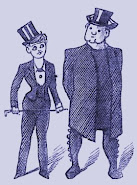
June 18, 1831. Voice of the People:
“Almost every large town has its Trades Herald, Workman’s Advocate, Workers’ Guardian, or some other equally zealous and useful publication, all strenuously advocating the necessity of duly rewarding labour, and of improvement in the conditions of the working classes.”
Saturday, July 9, 1831. Henry Hetherington, publisher. Quoted in The Poor Man’s Guardian:
“But if the Court is determined to confirm the conviction, then I here unhesitatingly declare, that I will set the law at defiance; - that law which the present Attorney-general himself declared was so odious - so iniquitous - so tyrannical , that it never could be carried into effect without holding “a dagger at the throat, and wresting the pen from the hand of every man who could write;” and yet the representative of the very man who used these words is now holding a dagger at my throat, but he shall strike it in before he wrests the pen from my hand, or prevents me from publishing a penny paper for the people every week, which I will do in defiance of this odious law, be the consequences what they may.”
Henry Hetherington was born in 1792 in Compton-street, Soho and apprenticed as a printer with the father of Luke Hansard. He found himself unemployed and went to Belgium where he worked at his trade for a spell before returning to London. His first published work was a pamphlet titled “Principles and Practice contrasted; or, a Peep into “the only true church of God upon earth,” commonly called Freethinking Christians” in 1828.
He helped found the Mechanic’s Institute and kept a shop at 13 Kingsgate-street, Holborn from whence he issued the first number of the Poor Man’s Guardian in 1831. He wrote a document that was the basis for the trade union “National Union of the Working Classes” which eventually led to the formation of Chartism.
With three convictions against him for publishing the Guardian he went into hiding in Manchester, but was taken by the Bow-street runners when he returned to London to visit his dying mother. He was lodged in Clerkenwell gaol for six months but managed to continue clandestine publishing of the newspaper. Over 500 men and women connected with the publishing of unstamped newspapers were gaoled including John Cleave and his wife who bravely carried on publishing when her husband was in gaol.
In 1833 Hetherington moved to the Strand where he published “The Destructive” and “The London Dispatch,” which reached a circulation of 25,000 copies sold weekly. When the government finally reduced the newspaper stamp to one penny (originally 4 pennies) in 1836 he published the “Twopenny Dispatch” and the “Odd-Fellow.” The “Odd-Fellow” was not the first paper to have political and gag cartoons on the front page but one of several which found the printing of cheap comic wood-cuts a great circulation booster. Cartoonists included Robert Seymour, William Harvey, and Kenny Meadows. Radical press-men John Cleave and Benjamin Davey Cousins also made great use of the front-page “comicalities.”
The “Twopenny Dispatch” promised an abundance of “Murders, Rapes, Suicides, Burnings, Maimings, Theatricals, Races, Pugilism, and all manner of moving accidents 'by flood and field'. In short, it will be stuffed with every sort of devilment that will make it sell.”
Hetherington was jailed three times for “blasphemy” and in his last will and testament specified a non-religious burial. He did not believe in “the popular notion of the existence of an All-mighty, All-wise, and Benevolent God -- possessing intelligence, and conscious of his own operations; because these attributes involve such a mass of absurdities and contradictions, so much cruelty and injustice on His part to the poor and destitute portion of His creatures, -- that, in my opinion, no rational reflecting mind can, after disinterested investigation, give credence to the existence of such a Being.”
Henry Hetherington died August 24, 1849 aged 57. G. J. Holyoke ended his graveyard oration saying that “when in future times the pilgrims of industry shall visit this shrine, they will exclaim --
‘HERE LIES A POOR MAN’S GUARDIAN!’
And poor men will drop tributary tears over his grave.”










*All comic cuts from the Odd Fellow











"Aristocracy/ Democracy", a draw real as life, more than a hundred years after... Amazing artist, unknown for me! Thanks!
ReplyDelete